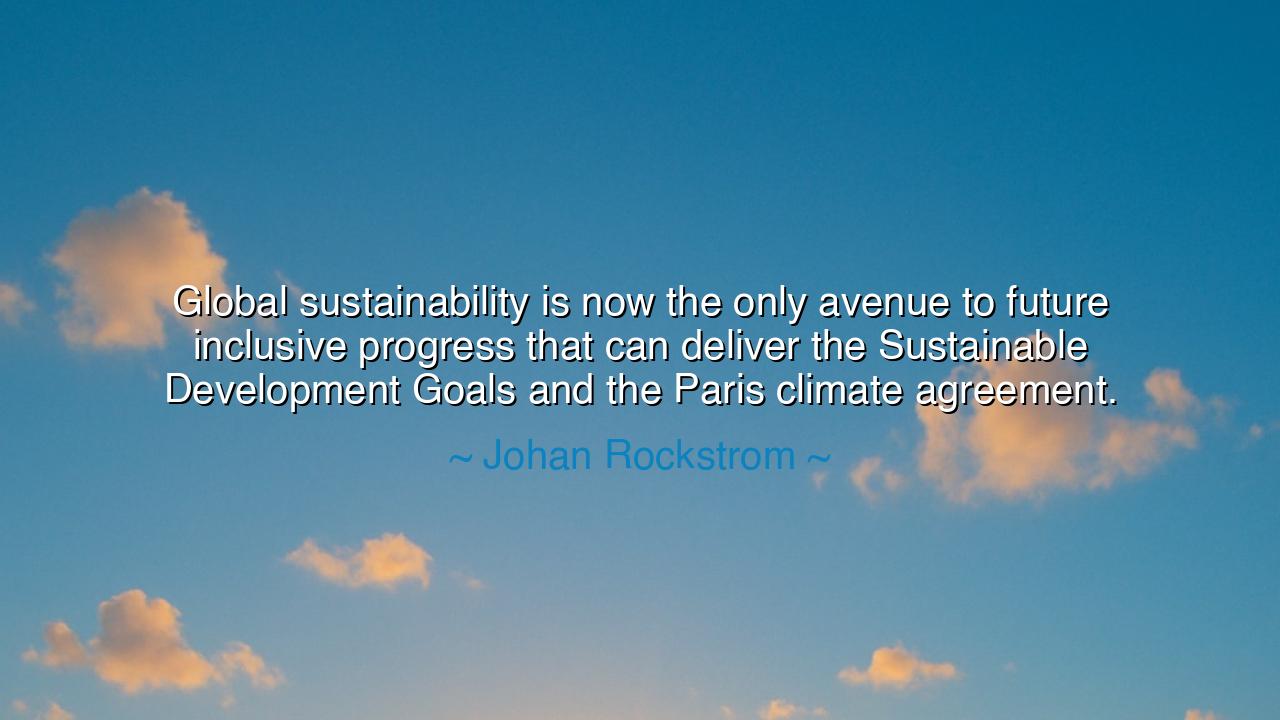
Global sustainability is now the only avenue to future inclusive
Global sustainability is now the only avenue to future inclusive progress that can deliver the Sustainable Development Goals and the Paris climate agreement.






In the unfolding story of humanity, there is a profound truth that must be understood and embraced by all generations: the future of the world hinges on our ability to create a path toward sustainability. Johan Rockström’s words, "Global sustainability is now the only avenue to future inclusive progress that can deliver the Sustainable Development Goals and the Paris climate agreement," resonate with a clarion call to action. Sustainability, as Rockström rightly points out, is no longer an option—it is the only path forward. Without embracing it, we risk not only the health of our planet but the well-being of generations to come. Sustainability is not merely a goal or a set of policies; it is the very foundation upon which our future must be built.
In the ancient world, the concept of balance was deeply ingrained in the teachings of the greatest philosophers. Aristotle, for example, believed in the notion of the Golden Mean, the idea that virtue lies in balance, in avoiding extremes. The ancient Greeks saw the world as a delicate balance between nature, the gods, and humanity. To disturb this balance was to invite chaos and disorder. The same understanding applies today when we consider the planetary systems that sustain life. Our failure to respect the balance of nature, to live within the limits of our environment, would lead to consequences as dire as the ancient Greeks feared—a world of imbalance and destruction. Rockström’s words echo this timeless truth: global sustainability is not just a wise choice; it is the only path that can ensure the survival and flourishing of all life on Earth.
Consider the story of Rome, which, at its peak, was a society of immense power and prosperity, yet it eventually faltered because it failed to account for the sustainability of its resources. The Roman Empire grew vast through conquest and expansion, but its relentless pursuit of wealth and power drained the resources of its territories. Forests were cleared, soil was exhausted, and the empire, though mighty in its prime, crumbled under the weight of its unsustainable practices. The fall of Rome serves as a warning to us: without respect for the environment, without a focus on sustainable development, even the greatest civilizations can fall. Rockström’s assertion that sustainability is now the only avenue for progress is a call to avoid the same fate—to build a future where resources are respected, not exploited.
Rockström also ties global sustainability to the achievement of the Sustainable Development Goals (SDGs) and the Paris climate agreement. These are not abstract ideals but critical frameworks that aim to create a world where prosperity is shared, poverty is alleviated, and planetary health is maintained. In the same way that the ancient Egyptians constructed monumental pyramids to align with the stars and to reflect their understanding of cosmic order, we, too, must build our world according to principles that align with the natural order. The Paris Agreement, for example, is a call to unite as a global community, recognizing that the health of the planet and the well-being of its inhabitants are inseparably linked. Without this unity, without global sustainability, we risk losing the very foundation upon which civilization is built.
The lesson here is both simple and profound: sustainability is not just a buzzword or a fleeting trend—it is the lifeblood of our future. Just as the great leaders of the past understood the necessity of building societies that respected the natural world, so too must we take the necessary steps today. We are the inheritors of the earth’s resources, but we are also its stewards, entrusted with the task of ensuring that those resources are used wisely and preserved for future generations. Rockström’s words urge us to act now, to understand that the choices we make today will shape the world of tomorrow. The Sustainable Development Goals and the Paris Agreement are not just goals for governments—they are calls to action for each of us to play our part in creating a sustainable future.
In practical terms, this means that each of us must recognize the power we hold in shaping the future. Whether through the choices we make in our personal lives, the decisions we support in our communities, or the policies we advocate for at the global level, we must act with the long-term in mind. Just as Aristotle taught that virtue is a balance between excess and deficiency, we must find the balance between progress and sustainability—between economic growth and environmental responsibility. Every step we take in reducing waste, conserving energy, supporting sustainable businesses, or advocating for climate justice contributes to a future where the world can thrive for generations to come.
Let us remember that global sustainability is not a distant ideal but an urgent necessity. The future is shaped by the choices we make today, and it is in our hands to ensure that it is a future of hope, prosperity, and justice. Just as the ancients understood the delicate balance that must be maintained for society to flourish, so too must we recognize that balance in our relationship with the planet. The Paris Agreement and the Sustainable Development Goals offer a blueprint for this future—one that we must not only imagine but actively create. Now is the time to turn this vision into reality, for the health of the Earth and the well-being of all its people depend upon it.






AAdministratorAdministrator
Welcome, honored guests. Please leave a comment, we will respond soon